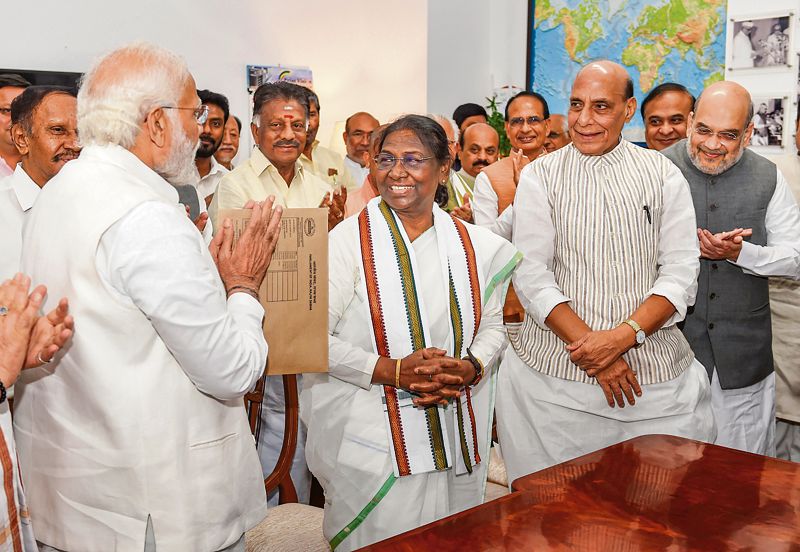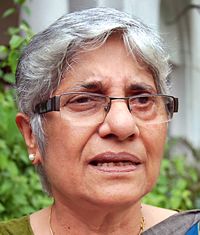
Masterstroke: Unlike other categories, like Muslims, women and Dalits, who have got more used to tokenism, the tribals are new to it. PTI
Senior Political Commentator
Several years ago, I was in Bhubaneswar for a conference on child nutrition. The tragic deaths of children due to malnutrition in a place called Nagada had made headlines. They had no access to healthcare facilities, a ration shop, and even a school was a distant dream. When I went for my morning walk around the hotel garden, I found women — some of them tribals — cleaning the place. The moment I would approach them, they would take several steps back and bow low. They were shy and deferential to what they thought was authority.
The BJP’s stakes happen to be the highest in states where there are large pockets of tribal population.
That image returned to my mind as I heard Droupadi Murmu’s candidature announced for the President of the republic. Those invisible women on the peripheries of India could now have one of their own sit in the exalted office of the President. The three Chiefs of the armed forces would salute her, as their supreme commander, if she is elected, which is expected. Vice-Chancellors will receive her as visitor to Central universities. And if she makes suggestions to them on how the system of higher education can bring a fresh perspective to bear on its curriculum — of proximity to nature, respect for resources and an egalitarian way of life that the tribal people have believed in — they will be compelled to listen to her.
This is the first time that a tribal leader has been nominated, and that too a woman, for the country’s highest office. Murmu’s nomination represents a devolution of power that has taken place in our democracy, however flawed, to give ‘satta mein shirkat’ to the most marginalised, even though it may be symbolic. Undoubtedly symbolism by itself is not enough but it has its place in a democratic polity.
On the one hand, our democracy is devolving by allowing those on the margins to come centre stage, on the other hand, its fault lines are deepening. For, the BJP’s announcement of Murmu as its candidate came at the same time as the crisis in Maharashtra boiled over. MLAs holed up in resorts in Gujarat, Guwahati and Goa is a story that has become familiar, be it in elections to the Rajya Sabha, state council or for undoing a government and forming a new one. The use of money or agencies like the ED and CBI to influence elected representatives is the new norm.
The symbolism of Murmu for Rashtrapati Bhavan is backed by hard-nosed political considerations. The BJP has high stakes in India’s heartland and the western states. Even though the party stays a step ahead in the election game, two terms in power are bound to create anti-incumbency, particularly with growing economic hardship. The tribals are 8.6% of the country’s population. The BJP’s stakes happen to be the highest in states where there are large pockets of tribals — Madhya Pradesh (14.7%) and Gujarat (8.6%), where it wants to retain power; and Jharkhand (8.3%), Rajasthan (8.9%), Maharashtra (10.1%), Odisha (9.2%) and Chhattisgarh (7.5%), where it wants to wrest power from its opponents. Then there are the tribal-dominated Northeastern states, where it has made inroads and would want to consolidate its hold.
Murmu’s nomination will have an impact on the tribal community. Unlike other categories, like Muslims, women and Dalits who have, relatively speaking, got more used to the politics of symbolism, the tribals are new to it. The BJP can be expected to use it to the hilt in the advocacy of its agenda.
On the Opposition side, Yashwant Sinha agreed to be its face for Rashtrapati after Sharad Pawar, Farooq Abdullah and Gopalkrishna Gandhi declined the offer. If Sinha had also refused, it would have left the Opposition red-faced. The significance of Sinha’s fight lies in being able to rally the largest possible number of opposition groups behind him in preparation for Battle 2024.
Over the years, every President has left his or her mark on the presidency. The proactive Rajendra Prasad, who enjoyed a parity of status with PM Nehru, would advise him on a host of issues. It was Prasad’s opposition to the Hindu Code Bill, a civil law to replace the personal law, which delayed its passage. And when it did come in the mid-fifties, it was in a truncated form as three Bills to govern matters of succession, divorce and adoption.
Zail Singh, known for his adventurism, had threatened to dismiss Rajiv Gandhi, though the PM had an unprecedented 414 Lok Sabha MPs’ majority, and appoint someone else — he sounded out Vice-President R Venkataraman and VP Singh. Fortunately, he pulled back from the brink.
The pliant Fakhruddin Ali Ahmed is remembered for not questioning the promulgation of the Emergency imposed by Indira Gandhi in 1975, which abridged fundamental rights and led to repressive measures.
Venkataraman, who navigated four premierships (Rajiv Gandhi, VP Singh, Chandra Shekhar and PV Narasimha Rao) between 1987 and 1992, a turbulent period, saw himself as an ‘emergency light’ which came on only when there was a crisis. KR Narayanan, who nudged and advised the government, liked to look at himself as a ‘working President’. ‘Missile man’ APJ Abdul Kalam was loved by children. Pranab Mukherjee was ‘constitutionally correct’; as a Congressman he had to deal with a BJP government in the saddle, headed by a powerful and popular PM.
If she gets elected, what would Murmu like her presidency to be known for? To ensure that ‘Nagadas’ do not happen anywhere in India? That every child is nourished and educated? That addressing malnutrition remains on the radar of policymakers, women’s organisations, NGOs and is given the highest priority?
The Rashtrapati is not supposed to play an executive role but is the ‘custodian of the Constitution’. And yet, s/he is in a position to give a moral lead and keep on the radar key issues, particularly those affecting children and women and the forgotten. Many look to Murmu with expectation today.
Join Whatsapp Channel of The Tribune for latest updates.




























